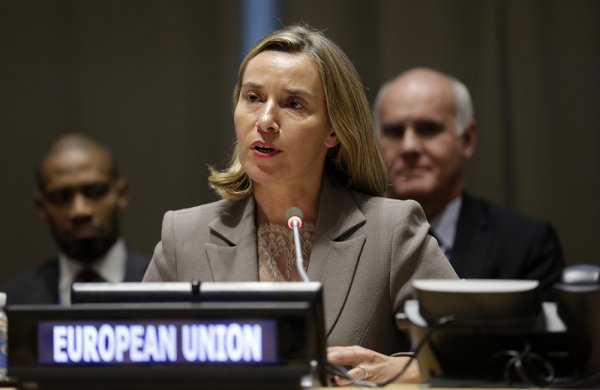If someone offered you half a billion euros to end violence against women and girls, you’d thank them. Especially if you were acutely aware of the many worthwhile strategies and organisations presently starved for support.
Especially if you had seen the diverse and insidious forms of violence – from intimate partner violence to state-sponsored violence – that women have been courageously standing up against for decades.
We join others in extending huge appreciation to the European Union for announcing last week a €500 million grant to the United Nations, to support work to end violence against women and girls. This pandemic destroys lives, communities and families in every country. It requires urgent and comprehensive action from everyone.

EU and UN representatives at the launch of the Spotlight Initiative in New York. Photo: Flickr/UN Women/Ryan Brown
But the launch of this EU-UN partnership was also notable in its failure to mention one of the primary and most consistent sources of support for the work that it now wants to fund: The UN Trust Fund to End Violence against Women.
Funds and trust
The Trust Fund was established in 1996 by a general assembly resolution. It is administered by the UN Women organisation on behalf of the UN system. It makes grants to NGOs and women’s rights groups, UN country teams and governments. Over the last 20 years, it has disbursed more than $125 million to initiatives in 139 countries and territories.
The Trust Fund has a unique, collective decision-making process that engages UN organisations, experts in ending violence against women and girls, and civil society groups. Independent evaluations of the Trust Fund have found that it knows how to successfully identify and strengthen innovative initiatives for ending violence against women.
However, regarding last week’s announcement, we understand that the EU and the UN intend to put this money into another “multi-partner trust fund”. A variety of new oversight, technical and other committees and structures would be created.

Federica Mogherini, EU High Representative and Vice-President of the Commission, speaks during the event. Photo: Flickr/UN Women/Ryan Brown
Our concern is that the proliferation of new ‘mechanisms’ diverts crucial resources to bureaucracy and processes rather than change. The Trust Fund already has decision-making mechanisms with broader representation and buy-in across the UN system and amongst NGO advocates and women’s rights experts in ending violence against women.
Why put money into new mechanisms that lack such expertise, experience and worldwide relationships?
The proliferation of new ‘mechanisms’ diverts crucial resources to bureaucracy and processes rather than change.
The creation of a ‘new’ mechanism could even make it harder for the Trust Fund to raise resources for its grant-making. This would threaten crucial support to innovative projects and to women’s rights organisations and NGOs working to end violence against women around the world.
To our knowledge, there is no provision in this commitment to ensure that the Trust Fund is sustained and strengthened. This must be remedied.
The Trust Fund is not a perfect mechanism. It would need to be upgraded and enhanced to manage half a billion euros (its grant-making has totalled $10 to $20 million annually and it has focused on giving smaller grants). But building on its existing practice is far preferable to using a new structure and establishing committees that have no track record, no portfolio and no expertise.
Grants and goals
Over the last 15 years, European donors have been leaders in insisting on and supporting the international aid effectiveness agenda and pushing for efficiency, transparency and coherence across the UN system. The EU also supported women’s rights advocates’ calls for the creation of UN Women, in 2010.

The The UN General Assembly during the launch of the Spotlight Initiative. Photo: Flickr/UN Women/Ryan Brown
But UN Women has not received a €500 million grant, and it remains underfunded. Ignoring the existence of the Trust Fund appears to be a deliberate invisibilisation of decades of feminist work, and it stands in direct contradiction to the EU’s commitments to aid effectiveness and efficiency.
At the same time, the new EU-UN initiative has yet to reach out to leading experts and organisations on ending violence against women and engage them on the best ways forward.
Ignoring the existence of the Trust Fund appears to be a deliberate invisibilisation of decades of feminist work.
At the UN, business as usual is the greatest obstacle to rebuilding the institution’s credibility. UN secretary general Antonio Guterres has made a point of asserting his ‘feminism’. At the launch of the new EU-UN initiative, he noted that violence against women is about exercise of power.
Guterres must now use his power to reverse a predictable trend of under-resourcing UN Women, the Trust Fund and other organisations and programs for women’s rights. He should insist that the new European funding announced last week is managed by the Trust Fund to End Violence against Women.
UN secretary general Antonio Guterres has made a point of asserting his ‘feminism’.
We urge EU and UN leadership to think carefully about the goal of this generous gift. If they want truly groundbreaking impact, they must draw on the vibrancy, determination and expertise of women’s rights advocates and activists, organisations, funds and networks. The Trust Fund, despite its limitations, is the suitable body to manage these funds.
The Trust Fund has already reached millions of people, and while improvements are needed, it is trusted by those who have received grants and benefited from their outcomes. The fund has spent 20 years building that trust. We hope the EU and the UN will honour that.
This post originally appeared on opendemocracy.net. Main image courtesy of Flickr/UN Women.




